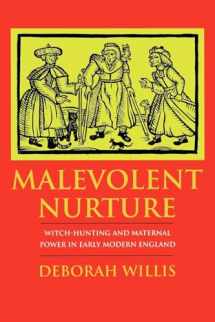
Malevolent Nurture: Witch-Hunting and Maternal Power in Early Modern England
ISBN-13:
9780801430046
ISBN-10:
0801430046
Edition:
Illustrated
Author:
Deborah Willis
Publication date:
1995
Publisher:
Cornell University Press
Format:
Hardcover
280 pages
Category:
Magic Studies
,
Occult & Paranormal
,
Women's Studies
FREE US shipping
Book details
ISBN-13:
9780801430046
ISBN-10:
0801430046
Edition:
Illustrated
Author:
Deborah Willis
Publication date:
1995
Publisher:
Cornell University Press
Format:
Hardcover
280 pages
Category:
Magic Studies
,
Occult & Paranormal
,
Women's Studies
Summary
Malevolent Nurture: Witch-Hunting and Maternal Power in Early Modern England (ISBN-13: 9780801430046 and ISBN-10: 0801430046), written by authors
Deborah Willis, was published by Cornell University Press in 1995.
With an overall rating of 3.9 stars, it's a notable title among other
Magic Studies
(Occult & Paranormal, Women's Studies) books. You can easily purchase or rent Malevolent Nurture: Witch-Hunting and Maternal Power in Early Modern England (Hardcover) from BooksRun,
along with many other new and used
Magic Studies
books
and textbooks.
And, if you're looking to sell your copy, our current buyback offer is $0.3.
Description
Why were women far more likely than men to be executed for witchcraft in the early modern period? Questioning approaches that focus narrowly on the male role in witch-hunting in England and Scotland, Deborah Willis examines the fact that women were also frequently the accusers.Willis draws on the strengths of feminist, new historicist, and psychoanalytic criticism and on such primary sources as legal documents, pamphlet literature, religious tracts, and stage plays. Both the witch and her female accuser, Willis concludes, were engaged in a complex, intricate struggle for survival and empowerment in a patriarchal culture, and they stood in uneasy relation to definitions of female identity that rewarded nurturing behavior.Malevolent Nurture disentangles popular images of the witch from those endorsed by male elites. Among villagers, the witch was most typically imagined as a malevolent mother, while elites preferred to view her as a betraying servant of Satan. Analyzing King James VI and I's involvement in the North Berwick witchcraft trials, Willis shows how his elite atittudes were nevertheless influenced by his relationships with his brith mother, Mary Queen of Scots, and another maternal figure, Queen Elizabeth I.Willis also shows that Shakespeare, in Richard III, Macbeth, and Henry VI, and other middle-class playwrights incorporated the beliefs of the ruling class and villagers alike in their representations of witches.


We would LOVE it if you could help us and other readers by reviewing the book
Book review

Congratulations! We have received your book review.
{user}
{createdAt}
by {truncated_author}


